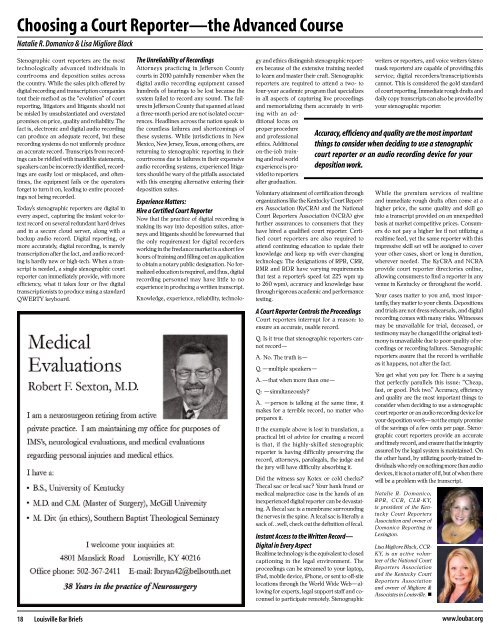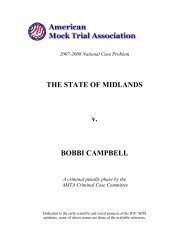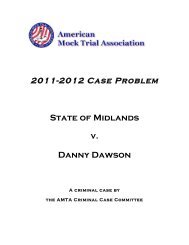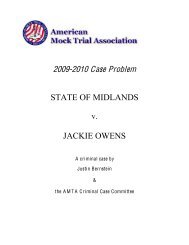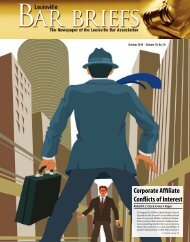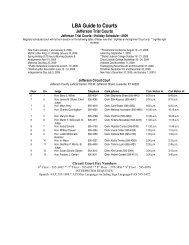Complimentary Issue - Louisville Bar Association
Complimentary Issue - Louisville Bar Association
Complimentary Issue - Louisville Bar Association
- No tags were found...
Create successful ePaper yourself
Turn your PDF publications into a flip-book with our unique Google optimized e-Paper software.
Choosing a Court Reporter—the Advanced CourseNatalie R. Domanico & Lisa Migliore BlackStenographic court reporters are the mosttechnologically advanced individuals incourtrooms and deposition suites acrossthe country. While the sales pitch offered bydigital recording and transcription companiestout their method as the “evolution” of courtreporting, litigators and litigants should notbe misled by unsubstantiated and overstatedpromises on price, quality and reliability. Thefact is, electronic and digital audio recordingcan produce an adequate record, but theserecording systems do not uniformly producean accurate record. Transcripts from recordingscan be riddled with inaudible statements,speakers can be incorrectly identified, recordingsare easily lost or misplaced, and oftentimes,the equipment fails or the operatorsforget to turn it on, leading to entire proceedingsnot being recorded.Today’s stenographic reporters are digital inevery aspect, capturing the instant voice-totextrecord on several redundant hard drivesand in a secure cloud server, along with abackup audio record. Digital reporting, ormore accurately, digital recording, is merelytranscription after the fact, and audio recordingis hardly new or high-tech. When a transcriptis needed, a single stenographic courtreporter can immediately provide, with moreefficiency, what it takes four or five digitaltranscriptionists to produce using a standardQWERTY keyboard.The Unreliability of RecordingsAttorneys practicing in Jefferson Countycourts in 2010 painfully remember when thedigital audio recording equipment causedhundreds of hearings to be lost because thesystem failed to record any sound. The failuresin Jefferson County that spanned at leasta three-month period are not isolated occurrences.Headlines across the nation speak tothe countless failures and shortcomings ofthese systems. While jurisdictions in NewMexico, New Jersey, Texas, among others, arereturning to stenographic reporting in theircourtrooms due to failures in their expensiveaudio recording systems, experienced litigatorsshould be wary of the pitfalls associatedwith this emerging alternative entering theirdeposition suites.Experience Matters:Hire a Certified Court ReporterNow that the practice of digital recording ismaking its way into deposition suites, attorneysand litigants should be forewarned thatthe only requirement for digital recordersworking in the freelance market is a short fewhours of training and filling out an applicationto obtain a notary public designation. No formalizededucation is required, and thus, digitalrecording personnel may have little to noexperience in producing a written transcript.Knowledge, experience, reliability, technologyand ethics distinguish stenographic reportersbecause of the extensive training neededto learn and master their craft. Stenographicreporters are required to attend a two- tofour-year academic program that specializesin all aspects of capturing live proceedingsand memorializing them accurately in writingwith an additionalfocus onproper procedureand professionalethics. Additionalon-the-job trainingand real worldexperience is providedto reportersafter graduation.Voluntary attainment of certification throughorganizations like the Kentucky Court Reporters<strong>Association</strong> (KyCRA) and the NationalCourt Reporters <strong>Association</strong> (NCRA) givefurther assurances to consumers that theyhave hired a qualified court reporter. Certifiedcourt reporters are also required toattend continuing education to update theirknowledge and keep up with ever-changingtechnology. The designations of RPR, CRR,RMR and RDR have varying requirementsthat test a reporter’s speed (at 225 wpm upto 260 wpm), accuracy and knowledge basethrough rigorous academic and performancetesting.A Court Reporter Controls the ProceedingsCourt reporters interrupt for a reason: toensure an accurate, usable record.Q. Is it true that stenographic reporters cannotrecord—A. No. The truth is—Q.—multiple speakers—A.—that when more than one—Q: —simultaneously?A. —person is talking at the same time, itmakes for a terrible record, no matter whoprepares it.If the example above is lost in translation, apractical bit of advice for creating a recordis that, if the highly-skilled stenographicreporter is having difficulty preserving therecord, attorneys, paralegals, the judge andthe jury will have difficulty absorbing it.Did the witness say Kotex or cold checks?Thecal sac or fecal sac? Your bank fraud ormedical malpractice case in the hands of aninexperienced digital reporter can be devastating.A thecal sac is a membrane surroundingthe nerves in the spine. A fecal sac is literally asack of…well, check out the definition of fecal.Instant Access to the Written Record—Digital in Every AspectRealtime technology is the equivalent to closedcaptioning in the legal environment. Theproceedings can be streamed to your laptop,iPad, mobile device, iPhone, or sent to off-sitelocations through the World Wide Web—allowingfor experts, legal support staff and cocounselto participate remotely. Stenographicwriters or reporters, and voice writers (stenomask reporters) are capable of providing thisservice; digital recorders/transcriptionistscannot. This is considered the gold standardof court reporting. Immediate rough drafts anddaily copy transcripts can also be provided byyour stenographic reporter.Accuracy, efficiency and quality are the most importantthings to consider when deciding to use a stenographiccourt reporter or an audio recording device for yourdeposition work.While the premium services of realtimeand immediate rough drafts often come at ahigher price, the same quality and skill gointo a transcript provided on an unexpeditedbasis at market competitive prices. Consumersdo not pay a higher fee if not utilizing arealtime feed, yet the same reporter with thisimpressive skill set will be assigned to coveryour other cases, short or long in duration,wherever needed. The KyCRA and NCRAprovide court reporter directories online,allowing consumers to find a reporter in anyvenue in Kentucky or throughout the world.Your cases matter to you and, most importantly,they matter to your clients. Depositionsand trials are not dress rehearsals, and digitalrecording comes with many risks. Witnessesmay be unavailable for trial, deceased, ortestimony may be changed if the original testimonyis unavailable due to poor quality of recordingsor recording failures. Stenographicreporters assure that the record is verifiableas it happens, not after the fact.You get what you pay for. There is a sayingthat perfectly parallels this issue: “Cheap,fast, or good. Pick two.” Accuracy, efficiencyand quality are the most important things toconsider when deciding to use a stenographiccourt reporter or an audio recording device foryour deposition work—not the empty promiseof the savings of a few cents per page. Stenographiccourt reporters provide an accurateand timely record, and ensure that the integrityassured by the legal system is maintained. Onthe other hand, by utilizing poorly-trained individualswho rely on nothing more than audiodevices, it is not a matter of if, but of when therewill be a problem with the transcript.Natalie R. Domanico,RPR, CCR, CLR-KY,is president of the KentuckyCourt Reporters<strong>Association</strong> and owner ofDomanico Reporting inLexington.Lisa Migliore Black, CCR-KY, is an active volunteerof the National CourtReporters <strong>Association</strong>and the Kentucky CourtReporters <strong>Association</strong>and owner of Migliore &Associates in <strong>Louisville</strong>. •18 <strong>Louisville</strong> <strong>Bar</strong> Briefswww.loubar.org


